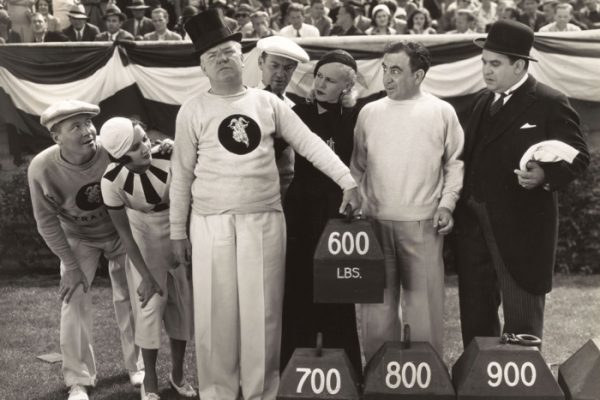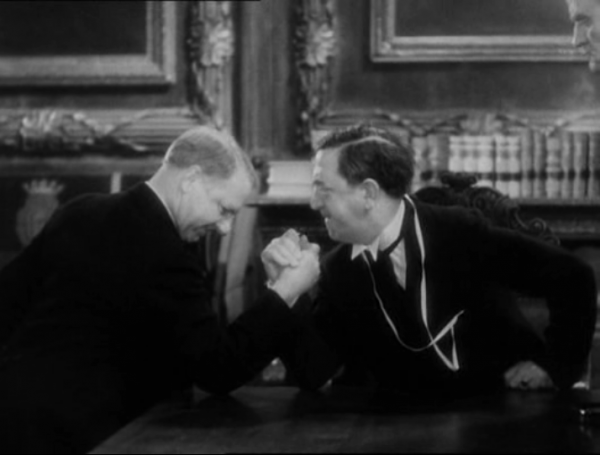Film Review: 1932’s “Million Dollar Legs” — Iconoclastic Euphoria
By Betsy Sherman
Does the movie have anything to say about our zeitgeist? Well, the very entertaining cabinet-meeting sequence shows that chamber to be a place of male posturing, humiliation, sado-masochism, duplicity, and, finally, abject sycophancy.
Million Dollar Legs. Presented by Channel Zero, playing at the Somerville Theatre’s MicroCinema on February 22 at 8 p.m.

Athletic activity in “Million Dollar Legs”: Jack Oakie, Susan Fleming, W.C. Fields, Syd Saylor, Lyda Roberti, Hugh Herbert, and Billy Gilbert.
Almost as soon as sound came to the movies, the movies started blowing raspberries.
As circumstance would have it, the relative freedom of the pre-Code era (before Hollywood’s self-censorship crackdown in 1934) coincided with the worst of the Great Depression under the ineffectual presidency of Herbert Hoover. During this window of time, a subgenre of anarchic comedy flourished, manifesting the nation’s ire like steam escaping from a manhole cover. What these movies lacked in discipline, they made up for in iconoclastic euphoria, knocking the blocks off the ruling class and lambasting petty, do-nothing politicians.
A prime example of the vaudeville-influenced lunatic comedy of the early ’30s will be getting a rare screening, presented by the Boston-area’s award-winning film-and-television series Channel Zero. It’s the 1932 Paramount picture Million Dollar Legs, which will screen in the MicroCinema at the Somerville Theatre on Friday, Feb. 22. The movie features a player who would become one of most recognizable stars in the industry, W.C. Fields.
The credits reveal another notable name among the film’s creators: Joseph Mankiewicz, future director-writer of All About Eve and many other classy ‘n’ serious pictures. Yes, the future Oscar-winner wrote quite a few of these rat-a-tat absurdist comedies that satirized issues of the day (in his 1933 Diplomaniacs, he sicced comedy duo Wheeler and Woolsey on a League of Nations peace conference). Mankiewicz had lived in Berlin and Paris and was likely familiar with Dada: he smuggled some of its ethos into this production.
Million Dollar Legs is set in a fictional European “Ruritania” called Klopstokia (“Chief exports: goats and nuts/Chief imports: goats and nuts/Chief inhabitants: goats and nuts”). The revelation that the country has gone broke is an allusion to the hot-potato issue of Europe’s still unpaid debt to the U.S. for loans made during the World War.
The star of the picture is the sadly forgotten Jack Oakie, a genial comic able to project both street smarts and goofiness. His best-known role is the Mussolini figure in Charlie Chaplin’s The Great Dictator. Here, he’s American brush salesman Migg Tweeney, inexplicably in Klopstokia on a business trip with his eccentric millionaire boss. He falls in love at first sight with a young woman who turns out to be the president’s daughter. She falls for him too, this being the sliver of Hollywood history when a rubber-faced comic could get the girl. Angela (played by Susan Fleming, the future Mrs. Harpo Marx) explains that all women in Klopstokia are named Angela, and all men George—a statement immediately contradicted when she introduces her little brother, Willie. She teaches Migg the nonsensical “Klopstokian Love Song”; this being a Paramount picture, it’s set to the tune of “One Hour with You,” theme of one of the studio’s Maurice Chevalier/Jeanette MacDonald musicals
Enter W.C. Fields as The President (he has no other name). Ruritanian pics normally feature kings and queens, but Paramount head of production B.P. Schulberg felt so strongly that Million Dollar Legs would offend European royalists that the writers had to make the setting a republic. The prez may be dotty and belligerent, but we feel bad for him once we meet the cabinet members trying to oust him.
The movie takes the concept of the political strongman to its logical conclusion: the way one achieves and holds onto power in Klopstokia is wrestling one’s rivals into submission. Thus every cabinet meeting begins with the prez arm-wrestling each secretary in turn, down the length of the conference table. The hot-headed Secretary of the Treasury, played by Hugh Herbert, will have no more; he schemes an overthrow. However, true to this subgenre, plot is always subordinate to gags: a highlight is when Billy Gilbert, playing the Secretary of the Interior, does his patented trying-in-vain-to-stifle-a-sneeze bit.

Arm wrestling for power in “Million Dollar Legs”: W. C. Fields and Hugh Herbert.
Wrangling all this silliness was director Edward Cline, who had worked with Buster Keaton and Mack Sennett. The spirit of Sennett’s Keystone Cops infuses Million Dollar Legs not only in madcap energy, but also in its casting of some of the old gang, including Ben Turpin, the silent comic known for crossing his eyes, who plays a black-hatted-and-caped spy. Andy Clyde, as the president’s majordomo, helps move the plot forward with his lightning-speed running (sped-up to cartoonish effect). Migg brainstorms a plan to boost Klopstokia into solvency and please his moneybags boss — who dreams of being involved in the upcoming 1932 Los Angeles Olympics — by forming the athletically endowed Klopstokians into a team that the brush magnate can sponsor.
The mutinous cabinet secretaries place hatred for the prez above national pride: they hire a seductress to sow dissension among the Olympic team. Their Mata Hari is Mata Machree, played by the wonderfully funny Polish actress Lyda Roberti. Her big number is “When I Get Hot in Klopstokia” (“when I start to dance/the fire horses start to prance”). Over the course of the gang’s long voyage across sea and land towards L.A., Mata weakens the athletes’, er, resolve. Once at the stadium, it’s up to Angela to break the femme fatale’s spell so that her dad and the team can start breaking Olympic records.
Million Dollar Legs opened on July 8, 1932, ahead of the L.A. Olympics’ start date of July 30. But it’s relevant to that year’s zeitgeist in another respect. With its premise of a strong leader taken literally, it captured an undercurrent of the contemporaneous presidential campaign, in which it was Democratic candidate Franklin Delano Roosevelt, not the incumbent president, who projected physical strength. That may seem paradoxical since, from our perch, we know that Roosevelt was basically wheelchair-bound. But the populace of that era was not so well informed. Since the press was complicit in the practice of neither photographing nor filming him in a wheelchair or dependent on crutches, candidate Roosevelt was perceived to be a man who had pretty much conquered infantile paralysis through treatments in Warm Springs, Georgia. In photographs and newsreel footage, he was often shown swimming. Compared to stick-in-the-mud Hoover, the ebullient FDR was the man of vigor in the presidential contest.
Does the movie have anything to say about our zeitgeist? Well, the very entertaining cabinet-meeting sequence shows that chamber to be a place of male posturing, humiliation, sado-masochism, duplicity, and, finally, abject sycophancy. So, a complete fantasy, right?
Betsy Sherman has written about movies, old and new, for The Boston Globe, The Boston Phoenix, and The Improper Bostonian, among others. She holds a degree in archives management from Simmons Graduate School of Library and Information Science. When she grows up, she wants to be Barbara Stanwyck.

That’s a great observation about Susan Fleming. My favorite line of hers in the film is when Oakie asks why all men and women are named George and Angela, and she deadpan replies, “Why not?” Klopstockia in a nutshell (no pun intended).